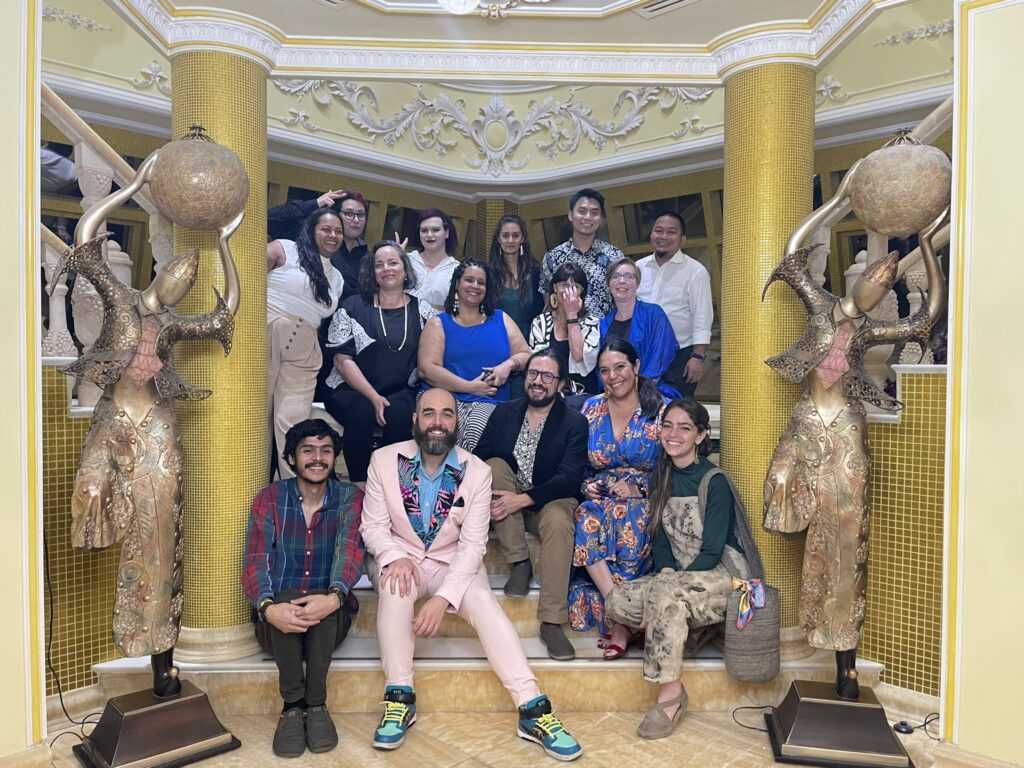by الأستاذ المساعد جانين محمد، الرئيس التنفيذي، زميل جلوبال أتلانتيك لمعهد لويتجا للإنصاف الاجتماعي.
قليلون قد غابوا عن عناوين الأخبار خلال الأسبوعين الماضيين من مؤتمر الأطراف 28، مؤتمر الأمم المتحدة للمناخ في دبي. يجمع هذا التجمع السنوي القادة والضيوف العالميين من جميع أنحاء العالم للعمل معا وتعبئة العمل العالمي الجماعي لمعالجة الآثار المتسارعة لتغير المناخ. كان من بينهم هذا العام العديد من الزملاء الأطلسيين وعلماء رودس من جميع أنحاء العالم والعديد من المجالات المختلفة. في 5 ديسمبر 2023، بفضل منحة معهد أتلانتيك كونيكت، اجتمع 19 زميلا في المحيط الأطلسي وعلماء رودس بإحساس واضح بالهدف والتحفيز. التقينا في وقت مبكر من المساء، بعد أسبوع كامل من أنشطة مؤتمر الأطراف 28، لتبادل معرفتنا وخبراتنا لبناء شيء من شأنه أن يولد عملا مستقبليا.
من هذه المحادثة، ولد مجتمع ممارسة جديد مثير للعدالة المناخية. يهدف مجتمع ممارسة العدالة المناخية إلى أن يكون شبكة عالمية من زملاء Atlantic وعلماء رودس ترتكز على القيم المشتركة الرئيسية للنظم الصحية العادلة والآمنة، وإنهاء الاستعمار، والعدالة المناخية، وتمكين الأقليات. يتمتع أعضاء مجتمع ممارسة العدالة المناخية بثروة من الخبرة والمعرفة للمساهمة.

"سمح لنا COP28 كزملاء في Atlatic وعلماء رودس بتعزيز روابطنا حقا، والتعرف على عمل بعضنا البعض في الفضاء المناخي، وجعل الجميع يفكرون في كيفية بناء تحالف دولي يقوم على القيم للعمل بقوة في مكافحة تغير المناخ، وتحديدا في المساحات الدولية".
داني سيغوالت، زميل المحيط الأطلسي العالمي للمساواة العرقية.
كيف ظهرت؟
خلال الأسابيع السابقة، مثل الزملاء والعلماء مجتمعاتنا في مؤتمر الأطراف 28. بصفتنا مندوبين، لاحظنا مناقشات حاسمة حول التخفيف والتكيف والتنفيذ. وبصفتنا متحدثين ومقدمين رئيسيين، دعونا إلى ضمان النظر في الآثار غير المتناسبة على مجتمعات الأقليات والعمل عليها على المستوى الدولي. كان من الواضح أن لدينا العديد من الاهتمامات المشتركة والمهارات المتنوعة التي يمكننا تجميعها معا.
ما ميز مؤتمر الأطراف الثامن والعشرين هو أنه كان الأول على الإطلاق الذي يستضيف يوم الصحة، وهو اعتراف طال انتظاره بأن آثار المناخ على الصحة والرفاهية يمكن أن تكون كارثية وأن هذه القضية تحتاج إلى رفعها إلى أعلى الأولويات الدولية.
كان مؤتمر الأطراف 28 لحظة تاريخية للأمم المتحدة. لأول مرة، تم تخصيص يوم للكشف عن العواقب الكارثية التي يترتب على تغير المناخ على صحتنا، وخاصة صحة مجتمعات الأقليات. بصفتي قائدا يركز على المحددات الاجتماعية لصحة مجتمع الميم عين ، أنا ممتن لفرصة التعلم من زملاء Atlantic وعلماء رودس الذين يهتمون بشدة بإنشاء مجتمع يسهل الوصول إليه ونابض بالحياة وصحي للجميع والشراكة معهم.
جوردي لوك، الرئيس التنفيذي - هاوس أوف ترانسيندنت ، زميل Global Atlantic.

الرئيس التنفيذي لمعهد لويتجا، الأستاذة المساعدة جانين محمد، هي الفائزة بجائزة فيكتوريا الأسترالية لعام 2024. (الصورة: Salty Dingo)
قيادة السكان الأصليين
تساهم شعوب الأمم الأولى على مستوى العالم بأقل قدر من تغير المناخ ومع ذلك فهي أكثر تأثرا. حضرت الأستاذة المساعدة جانين محمد، زميلة Atlantic Global للإنصاف الاجتماعي، وهي امرأة فخورة في نارونغا كاورنا والرئيسة التنفيذية لمعهد لويتجا الأسترالي، مؤتمر الأطراف 28 للتواصل مع الشعوب الأصلية في جميع أنحاء العالم والتحدث عن طرق العمل معا لمعالجة أزمة المناخ. كانت فخورة بالتحدث في عدد من الأحداث وأن تكون جزءا من إطلاق أول استراتيجية للمناخ والصحة في أستراليا من قبل مساعد وزير الصحة، جيد كيرني. بالنسبة للأستاذ المساعد محمد، فإن تحويل هياكل السلطة التي تملي المناقشات العالمية المتعلقة بتغير المناخ والصحة أمر حيوي لضمان أن يكون للشعوب الأصلية مستقبل مشرق. ويتمثل جزء من هذا العمل في أن تنفذ الدول القومية إعلان الأمم المتحدة بشأن حقوق الشعوب الأصلية تنفيذا كاملا.
تغير المناخ هو تكثيف للاستعمار. تعيش الشعوب الأصلية وتزدهر بسبب صلاتنا بالبلد والمجتمع والثقافة. يهدد تغير المناخ هذه الروابط. تسترشد الشعوب الأصلية بمعارفنا وخبراتنا التقليدية. يمكننا أن نقود الطريق للخروج من هذه الأزمة. لكن هياكل السلطة تحتاج إلى التغيير. العدالة المناخية هي الطريق إلى الأمام. لقد حان الوقت لتمكين الشعوب الأصلية وسكان جزر مضيق توريس والشعوب الأصلية على مستوى العالم من قيادة الحلول؛ لقد حان الوقت لشعوبنا أن يكون لها صوت.
الأستاذ المساعد جانين محمد، الرئيس التنفيذي، زميل جلوبال أتلانتيك لمعهد لويتجا للإنصاف الاجتماعي.
شارك!



